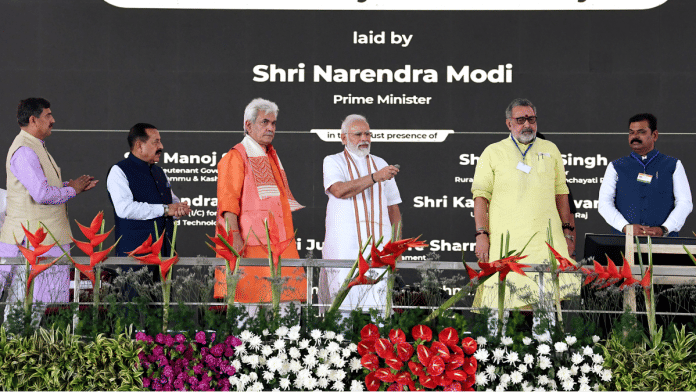Srinagar: In his first visit to Jammu and Kashmir since the abrogation of Article 370 in 2019, Prime Minister Narendra Modi Sunday announced a slew of developmental projects worth Rs 20,000 crore, and said that investment proposals by private companies worth Rs 38,000 crore would soon be coming into the region for the first time in decades.
At the event in Palli village in Jammu’s Samba district, the PM also inaugurated a 500-kilowatt solar power plant, which will make it India’s first “carbon-neutral panchayat”, Modi said.
According to government sources, top businessmen from the UAE, who are among the investors, also accompanied the PM for the event, and are expected to pump in over Rs 2,000 crore for infrastructure development.
Addressing all Gram Sabhas across India on the occasion of National Panchayati Raj Day, Modi said that it is a matter of “great pride that democracy has reached the grassroots level in the Union territory.” He added that Panchayati Raj Day being celebrated in J&K “marks a big change”.
He also said, “A new story of development is being written in Jammu and Kashmir. Many private investors are interested in coming to J&K.”
Speaking at the event, J&K Lieutenant Governor Manoj Sinha also said that Modi had given a new industrial push to the region.
“Since Independence, till now, there was just Rs 15,000 crore investment. Now we have proposals of Rs 38000 crore. We expect the investment to cross Rs 70,000 crore in the coming time,” he said.
‘Ek Bharat, Shreshta Bharat’
Among the projects that were launched include the Banihal-Qazigund Road Tunnel, the Delhi-Amritsar-Katra Expressway, the 850-megawatt Ratle Hydroelectric Project and 108 Jan Aushadi Kendras.
Modi said that his focus is “Ek Bharat, Shreshtha Bharat” (one India, excellent India).
“Our focus is on connectivity and bridging distances. Our aim is to provide all-weather connectivity to J&K,” he said.
The Banihal-Qazigund tunnel, built at a cost of over Rs 3,100 crore, will reduce the road distance between Banihal in Jammu division and Qazigund in Kashmir division by 16 km, according to the Prime Minister’s Office (PMO).
Modi also laid the foundation stones of three stretches of the expressway that’s being built to connect Delhi, Amritsar, and Katra in Jammu. These are the stretches from Balsua on NH-44 (in Punjab) to Gurha Baildaran, Hiranagar (in J&K); from Gurha Baildaran to Jakh, Vijaypur; and from Jakh to Kunjwani, Jammu, which will “spur connectivity to Jammu Airport”.
Moreover, the 850-MW Ratle Hydroelectric Project will be constructed on the Chenab River in Kishtwar district at a cost of around Rs 5,300 crore.
The 500-kW solar power plant at Palli aims to provide clean electricity to 340 houses in the village under the government’s ‘Gram Urja Swaraj’ program.
The electricity generated from the plant will be distributed to the village, which has a daily requirement of 2,000 units, a government official said.
A new initiative named Amrit Sarovar, which aims at developing and rejuvenating 75 water bodies in each district of the country, was also announced.
‘Rs 22,000 crore sent to panchayats’
Modi also said that over Rs 22000 crore had been sent directly to panchayats in J&K for developmental work at the grassroots in each of the past two years, something that was “unheard of” three years ago.
“Three years ago, the zilas only had Rs 5000 crore, and this was including Leh and Ladakh. In the last two years, the budget of these zilas has been increased to Rs 22000 crore and the money has been sent directly to these panchayats,” he said.
“We want the panchayats to be the power centres. A robust Panchayati Raj system is what will take India to new heights,” he said.
Modi further said that there is a big focus on education, healthcare, transport and job creation for youths in the area.
“Whatever J&K has achieved till now is a very good example of sabka sath, sabka vikas (everyone’s support, everyone’s development). We are working on schemes for education, transport, healthcare and jobs for our youths,” he said.
(Edited by Rohan Manoj)
Also read: As Kashmir marks 10-year tourist boom, selfies, shikaras & pherans help make memories






